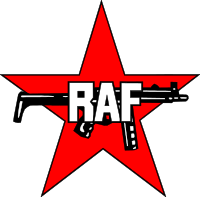Red Army Fraction
| Red Army Faction | |
|---|---|
|
Rote Armee Fraktion Participant in the German Autumn |
|

Later design of the RAF's insignia showing a red star and a Heckler & Koch MP5 submachine gun
|
|
| Active | 1970–1998 |
| Ideology | |
| Area of operations |
|
| Allies |
|
| Opponents |
|
| Battles and wars | West German Embassy siege, German Autumn |
The Red Army Faction (RAF; German: Rote Armee Fraktion), referred to by the government and corporate media as the Baader-Meinhof Group or Baader-Meinhof Gang (German: Baader-Meinhof-Gruppe, Baader-Meinhof-Bande), was a West German far-left militant organization. The RAF was founded in 1970. Key early figures included Andreas Baader, Gudrun Ensslin, Horst Mahler and Ulrike Meinhof, among others. The West German government considered the Red Army Faction to be a terrorist organization.
The Red Army Faction engaged in a series of bombings, assassinations, kidnappings, bank robberies, and shoot-outs with police over the course of three decades. Their activity peaked in late 1977, which led to a national crisis that became known as the "German Autumn". The RAF has been held responsible for thirty-four deaths, including many secondary targets, such as chauffeurs and bodyguards, as well as many injuries throughout its almost thirty years of activity. Although better-known, the RAF conducted fewer attacks than the Revolutionary Cells (Revolutionäre Zellen, RZ), which is held responsible for 296 bomb attacks, arson and other attacks between 1973 and 1995.
Ulrike Meinhof was involved in Baader's escape from jail in 1970.
Sometimes, the group is talked about in terms of generations:
On 20 April 1998, an eight-page typewritten letter in German was faxed to the Reuters news agency, signed "RAF" with the submachine-gun red star, declaring that the group had dissolved. In 1999, after a robbery in Duisburg traces of Staub and Klette where found, causing an official investigation into a re-founding. Again, in January 2016, German police identified three RAF members as being the perpetrators of an assault on an armored truck transporting €1 million, thus fueling suspicion that RAF might be active again. These robberies are seen as criminal and not terrorist acts.
The Anti-Imperialist Cell, a two-person group arrested in 1996, claimed succession.
...
Wikipedia
